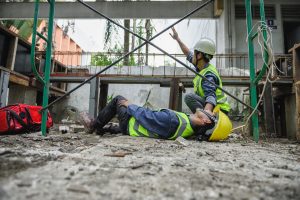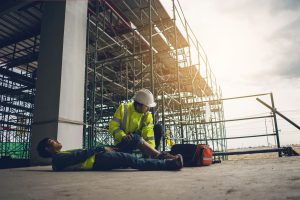This guide aims to provide you with information about claiming for injuries on construction sites. We will discuss who may owe you a duty of care while working on a construction site, and when you may have a valid personal injury claim if you were to be injured while working on a building site.
Additionally, we will provide examples of the different types of accidents that could occur on a construction site that you could claim for. We will also explain how compensation settlements are calculated for accident at work claims, and the different heads of claim you could be awarded.
Furthermore, this guide will provide examples of the evidence you could collect for your personal injury claim and the importance of gathering evidence as part of the personal injury claims process. We will also share how an experienced solicitor from our panel could help you with gathering this evidence and some of the benefits of making a construction injury claim on a No Win No Fee basis.
If you have any questions regarding the claiming process for construction site accidents or would like to receive free advice for your specific case, you can contact a member of our advisory team. They can be reached by:
- Calling 020 8050 2736
- Using our live chat pop-up.
- Completing our ‘claim online‘ form for a callback.

Learn More About Claiming For Injuries On Construction Sites
Choose A Section
- Who Is Liable For Injuries On Construction Sites?
- Claiming For Injuries On Construction Sites – Examples
- How Much Construction Accident Compensation Could You Receive?
- Evidence That Could Help You In A Construction Site Accident Claim
- Claiming For Injuries On Construction Sites On A No Win No Fee Basis
- More Resources About Construction Site Accident Claims
Who Is Liable For Injuries On Construction Sites?
If you have been injured while working on a construction site, you may be wondering who is liable for your injuries and when could you make a personal injury claim.
On a building site there will be a main contractor. There will also be subcontractors and self-employed workers. A contractor is the company that is in charge of the building site. This may be your employer, but doesn’t have to be. Your employer owes you a duty of care under the Health and Safety at Work etc. Act 1974, and states that your employer must take reasonable steps to help ensure your safety while you are working.
However, other third parties working alongside you on a construction build will also owe you a duty of care. This will be to ensure your reasonable safety.
Depending on who you work for and which party is responsible for breaching their duty of care that resulted in your injury, will determine who the personal injury claim is made against.
Additionally, the Construction (Design and Management) Regulations 2015 defines the legal duties for everyone involved in the construction process to manage the health, safety and welfare of construction workers.
More specific laws that set our rules regarding machinery and equipment include the Supply of Machinery (Safety) Regulations 2008, and the Provision and Use of Work Equipment Regulations 1998.
When Could I Make A Personal Injury Claim?
To be able to make a personal injury claim following a building site accident, you will need to demonstrate the following in order to have a valid claim:
- You were owed a duty of care.
- They breached this duty of care.
- Due to this breach, you suffered an injury.
If you have any questions regarding claiming for injuries on construction sites, or would like the validity of your specific case checked, you can contact a member of our advisory team.
Claiming For Injuries On Construction Sites – Examples
There are various ways that construction site accidents could occur. However, in order to have a valid personal injury claim, your injury must have been caused by your employer breaching their duty of care.
Some examples of how a building site accident could take place include:
- The site operator failed to put safety barriers or warning signs up around a deep excavation. Subsequently, the ground collapses and you fall into the trench and suffer a serious injury to your back.
- Your employer failed to provide you with a hard hat despite the need for one being identified. This led to brain injury when a scaffolding pole was dropped and struck you on the head.
- Building materials may not have been correctly secured on an upper level, creating the risk of falling objects. This could see the likes of a brick fall, causing a head injury and associated neck injuries.
- You were provided with a faulty jackhammer that had not been regularly maintained. The jackhammer malfunctioned and caused you to suffer a broken leg and fractured foot.
- Loose cable wires had not been properly covered or the hazard had not been signposted. Or the lighting was inadequate, meaning you couldn’t see the wires. Such potential issues could cause you to trip and suffer an ankle injury.
These are just a few examples of how a construction site accident could occur. To discuss your specific case and see whether you may have a valid personal injury claim, you can contact one of our advisors.

When Could You Claim Construction Accident Compensation?
How Much Construction Accident Compensation Could You Receive?
When making a personal injury claim following a construction site accident, how much compensation you could be awarded will depend on the various factors affecting your specific case.
However, all successful construction site accident claimants will receive general damages as part of their compensation payout. This head of your claim provides you with compensation for the injuries you suffered in the building site accident and the pain and suffering they have caused you.
Those valuing your construction accident claim for general damages may refer to a document called the Judicial College Guidelines (JCG) for guidance. This provides a list of various types of injuries at differing severity levels and assigns them compensation guidelines.
We have used some of these guidelines when creating the table below. However, you should only refer to this as guidance.
Compensation Table
Please note: The first line of our table is not taken from the JCG.
| Injury Type | Severity | Settlement Guidelines | More Information |
|---|---|---|---|
| Multiple Severe Injuries + Special Damages | Severe | £1,000,000+ | To cover multiple severe injuries plus financial losses such as nursing care, lost income, home modifications and other special damages |
| Brain and Head Injuries | Very Severe | £282,010 to £403,990 | Little, if any, evidence of environmental response, little or no language function, the need for full-time nursing care and double incontinence. |
| Moderate (i) | £150,110 to £219,070 | Cases where there is a personality change, intellectual deficit (moderate to severe) an affect on senses and a significant epilepsy risk leading to no job prospects. | |
| Back Injuries | Severe (i) | £91,090 to £160,980 | These types of back injuries will have serious consequence not usually linked to back injuries resulting in severe disability and pain. |
| Moderate(i) | £27,760 to £38,780 | For example, a prolapsed intervertebral disc with reduced mobility and nerve root irritation. | |
| Leg Injuries | Amputation (iii) | £104,830 to £137,470 | Where a single leg is amputated above the knee. |
| Neck Injuries | Severe (ii) | £65,740 to £130,930 | Such as substantial movement loss in the neck as well as loss of function of a limb or limbs due to damage or fractures to the cervical spine discs. |
| Knee Injuries | Severe (ii) | £52,120 to £69,730 | These types of knee injuries may require remedial surgery In the long term and result in continuing pain, discomfort, deformity or instability. |
| Ankle Injuries | Moderate | £13,740 to £26,590 | Ligament tears, fractures and similar injuries that result in difficulty standing, walking for long periods or walking on uneven ground. |
Claiming Special Damages For A Construction Site Injury
Another head of loss, special damages, may make up part of your compensation payout when claiming for the injuries you sustained in a construction site accident. This covers any financial losses linked to your injuries, such as:
- Lost income – if your injuries required you to take time off work to recover, you may have experienced a loss of earnings.
- Medical expenses – such as having to pay for prescriptions, physiotherapy or other medical treatment.
- Home adaptation costs – for example, if you needed a stairlift or ramp installed to help you cope with your injuries.
- Travel expenses – this could include taxi, train, or bus fares to medical appointments.
These expenses do need to be proven in order to claim for them under special damages. Therefore, you may need to supply evidence such as receipts, pay slips or bank statements.
For more information on how much compensation could be awarded to those claiming for injuries on construction sites, you can contact our advisory team. They can also provide you with a free valuation for your building site accident compensation claim.

When Could You Make A Building Site Injury Claim?
Evidence That Could Help You In A Construction Site Accident Claim
When claiming for injuries on construction sites, evidence will need to be presented that supports the claim. This evidence will need to demonstrate the type of building site accident that took place, what injuries you suffered, and who was liable for them.
Some examples of evidence that could be used to support a building site accident claim include:
- Accident book report – Any workplace with more than 10 employees legally has to have an accident report book on its premises. A copy of the report of your accident could be used to help support your case as it could provide details regarding your construction site accident.
- Video footage – For example, CCTV footage if the site was covered by security cameras.
- Medical evidence – Such as your medical records detailing your injuries and their subsequent treatments.
- Witness contact information – If anyone witnessed your accident, noting down their contact information could be beneficial to your claim as they may be able to provide a statement later on.
- Photographs – This could be of the accident site, or any visible injuries you have suffered.
If you decide to work with a solicitor on your construction site accident claim, they could help you with gathering more specific and additional evidence for your claim.
To see if you could be eligible to work with one of the construction accident solicitors on our panel, you can get in touch with a member of our advisory team. They could also provide you with free advice for your personal injury claim.
Claiming For Injuries On Construction Sites On A No Win No Fee Basis
One of the construction accident solicitors on our panel could help you claim compensation for your construction injury. As well as helping you gather evidence, ensuring your claim is submitted in full within the correct time limit, and negotiating a settlement on your behalf, they may also offer to represent you in your building site accident claim on a No Win No Fee basis. The specific terms they work under are that of a Conditional Fee Agreement.
Some of the benefits of working with a solicitor under this type of No Win No Fee arrangement include:
- No upfront service fees to pay.
- No ongoing fees to pay to retain your solicitor’s services.
- If the claim is unsuccessful, you will not have to pay your solicitor any fees for the work they have provided.
Alternatively, if they successfully claim compensation for you, this will take a success fee from this. There is a legal cap in place for the percentage that this fee can be. This helps to ensure that you keep the majority of your construction accident compensation.

Claim Compensation For A Construction Site Accident On A No Win No Fee Basis
Contact US
For more information about claiming for injuries on construction sites with the help of a No Win No Fee solicitor from our panel, you can contact our advisors. They are available 24/7 to help answer any questions you may have about the construction site accident claims process, as well as offering free advice for your specific case.
To reach them today, you can:
- Call 020 8050 2736
- Fill out our ‘Claim online‘ form for a callback.
- Use our live chat.
More Resources About Construction Site Accident Claims
Here are some more of our guides regarding accident at work claims:
- Advice on claiming for any eye injury on a construction site.
- How to make a fall from a height claim for any injuries sustained.
- Information about making forklift accident claims for work-related injuries.
Also, we’ve added a few external links that might prove useful:
- Details of when and how the Health and Safety Executive (HSE) investigate workplace accidents.
- NHS advice on how back problems are treated.
- Government advice on the eligibility criteria for Statutory Sick Pay (SSP).
If you’d like further information on claiming for injuries on construction sites, please contact a member of our team.
